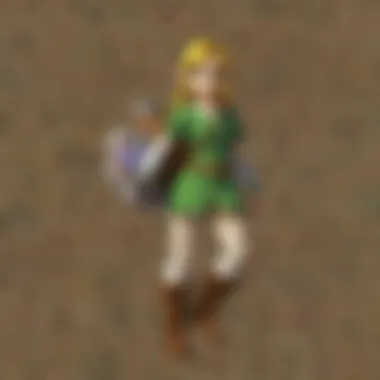Exploring Gamestop's Policy on Nintendo DS Game Purchases in the Modern Gaming Era


Game Reviews
While exploring Game Reviews, it's essential to dissect Gameplay Features and Mechanics. From the user interface to the intricacies of gameplay mechanics, we will unravel how Nintendo DS games fare in Gamestop's evaluation process. Understanding the nuances of gameplay is key to comprehending Gamestop's perspective on the value of these games in today's market.
Character Analyses
Diving into Character Analyses, we will discover the allure of popular characters within Nintendo DS games. From protagonists to antagonists, each character's role and significance will be scrutinized. By delving into Character Development and Backstories, we aim to unveil the depth of storytelling present in DS games and how Gamestop views the narrative aspect when considering trade-ins.
Lore Discussions
In the realm of Lore Discussions, we will explore the mythology and world-building intricacies embedded in Nintendo DS games. Uncovering legendary items and artifacts, we will draw parallels between in-game lore and real-world mythologies. Additionally, delving into Timeline Placement and Theories will offer insight into the continuity of DS games within broader gaming narratives.
Gameplay Strategies
Navigating through Gameplay Strategies, this section will focus on equipping readers with combat techniques, puzzle solutions, collectible insights, and boss battle tactics present in Nintendo DS games. By providing actionable tips and walkthroughs, readers will gain a competitive edge when engaging with DS games, potentially influencing Gamestop's valuation of these titles.
Introduction
This article delves into the current policies of Gamestop concerning the acquisition of Nintendo DS games. It aims to uncover whether Gamestop persists in accepting DS games for trade-ins or purchases, taking into account the ever-changing gaming milieu. Exploring the nuances of Gamestop's practices provides profound insights into the dynamics of the modern gaming market and sheds light on the evolving landscape of trading in Nintendo DS games.
Overview of Gamestop
Gamestop has established itself as a prominent player in the video game retail sector. The history of Gamestop elucidates its journey from a modest retail outlet to a behemoth in the gaming industry. Delving into the historical backdrop of Gamestop offers a contextual understanding of its evolution and endurance in the market. Moreover, the evolution of Gamestop's business model reflects its adaptability to shifting market trends and consumer preferences. This section delves into the intricate details of Gamestop's trajectory, showcasing its resilience and strategic acumen.


History of Gamestop
The history of Gamestop unveils a narrative of growth and adaptation in the competitive realm of video game retail. By tracing its origins and pivotal milestones, one can appreciate the strategic decisions that propelled Gamestop to its current stature. The key characteristic of Gamestop's history lies in its agile response to industry changes, solidifying its position as a formidable player. While facing challenges along the way, Gamestop's history exemplifies a blend of innovation and market acumen, vital for sustained success.
Evolution of Gamestop's Business Model
The evolution of Gamestop's business model mirrors the shifting dynamics of the gaming landscape. By embracing changes in consumer behavior and technological advancements, Gamestop has fine-tuned its strategies to cater to a diverse audience. The key characteristic of this evolution is Gamestop's ability to stay relevant amidst digital disruptions, leveraging its physical presence to offer unique gaming experiences. Despite challenges posed by online platforms, Gamestop's business model showcases resilience and adaptation, steering the company towards continued growth.
Nintendo DS Games
Nintendo DS games hold a special place in the hearts of gaming enthusiasts worldwide. The popularity of Nintendo DS games stems from their innovative gameplay mechanics and diverse library of titles. Exploring the factors that contribute to the enduring appeal of Nintendo DS games sheds light on the unique gaming experiences they offer. Additionally, the impact of digital platforms on physical game sales has reshaped the gaming industry, influencing the market dynamics surrounding Nintendo DS games.
Popularity of Nintendo DS Games
The popularity of Nintendo DS games transcends generational boundaries, captivating both seasoned gamers and newcomers. The key characteristic of Nintendo DS games' popularity lies in their ability to deliver immersive gameplay experiences that resonate with a wide audience. With a rich catalogue of titles spanning various genres, Nintendo DS games continue to attract enthusiasts worldwide. While facing competition from modern consoles, the popularity of Nintendo DS games remains undiminished, testament to their timeless appeal.
Impact of Digital Platforms on Physical Game Sales
The advent of digital platforms has revolutionized how games are distributed and consumed, influencing the traditional model of physical game sales. The key characteristic of this impact is the gradual shift towards digital downloads and online retailers, challenging the dominance of physical game discs. While digital platforms offer convenience and instant access to games, they have also posed challenges to brick-and-mortar retailers like Gamestop. Navigating this digital landscape requires adaptation and innovation, as companies explore new avenues to engage with tech-savvy consumers.
Current Scenario
In dissecting the current scenario of Gamestop's policies towards Nintendo DS games, it is imperative to navigate through the evolving dynamics of the gaming marketplace. Understanding Gamestop's stance on the acceptance and acquisition of DS games sheds light on the interplay between traditional physical game sales and the encroaching digital platforms. This section delves into the intricacies of Gamestop's trade-in policies and how they align with the shifting landscape of gaming.


Gamestop's Trade-In Policy
Acceptance of DS Games
The acceptance of Nintendo DS games by Gamestop holds significant weight in the realm of gaming enthusiasts. This facet of Gamestop's trade-in policy determines the feasibility of gamers looking to part ways with their beloved DS games. The key characteristic of Gamestop's acceptance of DS games lies in the convenience it offers to players, allowing them to trade in outdated titles for newer additions to their collection seamlessly. Despite facing competition from digital sales platforms, the acceptance of DS games at Gamestop remains a popular choice due to the physicality and tangibility that physical games provide to gaming aficionados. This unique feature sets Gamestop apart as a haven for gamers seeking to exchange their DS games for viable alternatives, though it also comes with the disadvantage of potentially lower trade-in values compared to online marketplaces.
Evaluation Criteria for DS Games
Gamestop's evaluation criteria for Nintendo DS games play a pivotal role in determining the value proposition of trade-ins. Understanding the evaluation criteria offers insights into the standards set by Gamestop when assessing the condition and desirability of DS games. This aspect contributes to the overall trade-in experience by ensuring transparency and fairness in the valuation process. The key characteristic of Gamestop's evaluation criteria lies in its consideration of factors such as game condition, rarity, and demand, influencing the final trade-in value offered to customers. While this process serves as a beneficial framework for both Gamestop and gamers, providing a structured approach to trade-ins, it also poses limitations in terms of subjective evaluations that may not always align with sellers' expectations.
Market Trends
Shift towards Digital Sales
The market trend toward digital sales represents a significant shift in consumer preferences within the gaming industry. As digital platforms continue to gain traction, the convenience and accessibility they offer have reshaped how players acquire and engage with games. This aspect of the market trend underscores the rising demand for digital content and the gradual phasing out of physical game copies. Despite this transition, physical game sales, including Nintendo DS games, maintain a niche appeal among collectors and purists who value owning tangible copies of their favorite titles. The unique feature of this shift towards digital sales highlights the adaptability of gaming retailers like Gamestop in diversifying their offerings to cater to a broad spectrum of gamers, striking a balance between physical and digital mediums.
Collectibility of Nintendo DS Games
The collectibility of Nintendo DS games contributes to the allure and nostalgia associated with classic gaming titles. Collectors and enthusiasts actively seek out rare and limited-edition DS games, driving up their demand and market value. This aspect underscores the investment potential of DS games as valuable assets within the gaming community, transcending their initial recreational purpose. The key characteristic of DS game collectibility lies in the intricacies of preserving and curating these titles, fostering a sense of exclusivity and prestige among collectors. While the collectibility of DS games presents opportunities for investors and nostalgia-seekers alike, it also poses challenges in terms of authentication and quality assurance, especially in a market flooded with counterfeit and reproduction products.
Competitive Landscape
Comparison with Other Retailers


Comparing Gamestop's trade-in policy with that of other retailers provides a holistic view of the competitive landscape within the gaming industry. Evaluating key differences and similarities in trade-in offerings sheds light on Gamestop's position as a premier destination for DS game transactions. The key characteristic of this comparison lies in the diversification of trade-in options available to players, highlighting Gamestop's competitive pricing and trade-in incentives. By offering competitive trade-in values and promotions, Gamestop sets itself apart as a preferred choice for gamers looking to exchange their DS games for store credit or cash value. While other retailers may offer similar services, Gamestop's longstanding reputation and expansive network of physical locations give it a strategic edge in attracting customers seeking reliable and efficient trade-in solutions.
Online Marketplaces for DS Games
The emergence of online marketplaces for Nintendo DS games introduces a new dimension to the competitive landscape of game trading. Online platforms offer sellers the opportunity to reach a broader audience and potentially fetch higher prices for their DS titles through auctions and direct sales. This unique feature provides sellers with greater autonomy and flexibility in setting prices and negotiating deals, bypassing the limitations of traditional brick-and-mortar trade-in models. However, online marketplaces also pose challenges in terms of reliability and security, as sellers must navigate through various platforms and payment methods to ensure a safe and satisfactory transaction. Despite these challenges, online marketplaces serve as valuable hubs for gamers and collectors seeking rare and sought-after DS games, expanding the reach and accessibility of the gaming community beyond physical storefronts.
Customer Perspectives
Customer perspectives play a pivotal role in shedding light on the intricate dynamics surrounding the acquisition and selling of Nintendo DS games, especially in the context of a retailer like Gamestop. Understanding the varied experiences, opinions, and preferences of customers is crucial in deciphering the ongoing relevance of physical game sales amidst the digital revolution sweeping the gaming industry. By delving into the lenses through which customers view Gamestop's policies and evaluating the alternative avenues available for selling DS games, one can glean valuable insights into the evolving consumer behaviors and the factors influencing their decisions.
Gamers' Experiences
- Feedback on Gamestop's Policies: Examining the feedback loop pertaining to Gamestop's policies unveils a mosaic of sentiments ranging from satisfaction to discontent among gamers. This interaction between customers and Gamestop provides vital clues on the effectiveness of the retailer's trade-in processes, pricing strategies, and overall customer service. Feedback acts as a sounding board for customers to voice their concerns, accolades, and suggestions, ultimately influencing Gamestop's decision-making processes in enhancing user experience.
- Alternative Options for Selling DS Games: Delving into the realm of alternative channels for selling DS games unveils a landscape dotted with diverse platforms, each offering unique advantages and disadvantages. From online marketplaces to specialized gaming communities, gamers are presented with a plethora of choices beyond Gamestop. Exploring these alternatives not only empowers customers with more control over their selling experiences but also prompts Gamestop to innovate and adapt to stay competitive in the evolving market environment.
Collector Community
- Investment Value of Nintendo DS Games: Unveiling the investment potential of Nintendo DS games within the collector community sheds light on a fascinating facet of gaming culture. The allure of rare editions, limited releases, and nostalgic classics contribute to the burgeoning interest in DS game collecting as a form of investment. Understanding the market dynamics influencing the value of these games equips collectors with valuable insights for making informed decisions regarding their acquisitions and portfolio management.
- Impact of Limited Editions: The impact of limited editions transcends mere monetary value, delving into the deeper emotional and sentimental attachments enthusiasts develop towards these exclusive releases. Limited editions serve as artifacts of gaming history, encapsulating unique narratives and designs that resonate deeply with collectors. Analyzing the impact of limited editions within the DS gaming space unravels the intricate interplay between scarcity, demand, and cultural significance, shaping the preferences and pursuits of avid collectors.
Conclusion
The Conclusion section serves as the culmination of our exploration into whether Gamestop continues to purchase Nintendo DS games in the contemporary gaming market. This segment encapsulates the key findings and insights gathered throughout the article, offering a decisive verdict on Gamestop's current stance regarding DS game trade-ins. It is vital as it crystallizes the evolving dynamics between physical and digital game sales, shedding light on the implications for players, collectors, and the gaming industry as a whole.
Final Verdict on Gamestop's Position
Summary of Findings
The Summary of Findings meticulously dissects Gamestop's approach towards DS games, unveiling essential details about their trade-in policies and evaluation criteria. This segment provides a comprehensive overview of Gamestop's response to the shifting gaming landscape, emphasizing the significance of adapting to digital platforms while maintaining avenues for physical game enthusiasts. By delving deep into Gamestop's strategies, this analysis offers a nuanced perspective on the interplay between retail practices and consumer demands, guiding DS game sellers towards informed decisions.
Recommendations for DS Game Sellers
The Recommendations segment delves into actionable advice for individuals looking to sell their Nintendo DS games, delineating strategic approaches to maximize value and convenience. Through detailed insights and practical tips, this section empowers sellers to navigate the competitive market with confidence, whether opting for traditional retailers like Gamestop or exploring alternative platforms. By outlining tailored suggestions and best practices, this analysis equips DS game sellers with the knowledge needed to make informed choices beneficial for their gaming collections or financial interests.







